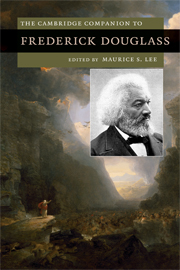Book contents
- Frontmatter
- Introduction
- 1 Douglass’s Self-Making and the Culture of Abolitionism
- 2 Identity in the Autobiographies
- 3 Douglass as Orator and Editor
- 4 Crisis and Faith in Douglass’s Work
- 5 Violence, Manhood, and War in Douglass
- 6 Human Law and Higher Law
- 7 Sentimental Douglass
- 8 Douglass among the Romantics
- 9 Douglass’s Black Atlantic: Britain, Europe, Egypt
- 10 Douglass’s Black Atlantic: The Caribbean
- 11 Douglass, Ideological Slavery, and Postbellum Racial Politics
- 12 Born into Slavery: Echoes and Legacies
- Guide to Further Reading
- Index
1 - Douglass’s Self-Making and the Culture of Abolitionism
Published online by Cambridge University Press: 28 July 2009
- Frontmatter
- Introduction
- 1 Douglass’s Self-Making and the Culture of Abolitionism
- 2 Identity in the Autobiographies
- 3 Douglass as Orator and Editor
- 4 Crisis and Faith in Douglass’s Work
- 5 Violence, Manhood, and War in Douglass
- 6 Human Law and Higher Law
- 7 Sentimental Douglass
- 8 Douglass among the Romantics
- 9 Douglass’s Black Atlantic: Britain, Europe, Egypt
- 10 Douglass’s Black Atlantic: The Caribbean
- 11 Douglass, Ideological Slavery, and Postbellum Racial Politics
- 12 Born into Slavery: Echoes and Legacies
- Guide to Further Reading
- Index
Summary
Introduced to the Abolitionists
It is difficult to overestimate the influence of abolitionist organizations on Frederick Douglass. In the fall of 1838, after fleeing slavery and settling in New Bedford, Massachusetts, abolitionists offered him a crucial source of hope, uplift, and self-transformation. A few months after moving to New Bedford, he began reading The Liberator, the Boston organ of the American Anti-Slavery Society, edited by William Lloyd Garrison. He subscribed a few months after moving to New Bedford even though he couldn't afford it, and paid the $2 annual fee in installments.
The Liberator was the most influential protest paper in American history. It relied on the Declaration of Independence and the Bible as sacred texts and called for an immediate end to slavery and equal rights for all people. It envisioned a heaven on earth in which the government of God replaced human government. It advocated nonviolence, declaring that revolution would be achieved through moral suasion alone. And it refused to compromise: “I will not equivocate - I will not excuse - I will not retreat a single inch,” Garrison had vowed in the first issue of The Liberator in January 1831. He remained true to his word. To offset this message of breathtaking idealism, Garrison employed a style of “extraordinary physicality”: in his pages oppressors trembled, nations quaked, statues leaped, and victims bled. While the Romantic poets had “spiritualized the natural world,” Garrison made palpable the moral repugnance against slavery. He spoke to Douglass’s heart.
- Type
- Chapter
- Information
- The Cambridge Companion to Frederick Douglass , pp. 13 - 30Publisher: Cambridge University PressPrint publication year: 2009
- 17
- Cited by

